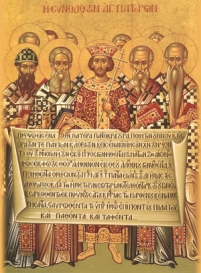On October 29, the nation’s attention was focused on Yankee Stadium and game two of the World Series. But at Wheaton College, several hundred people chose instead to crowd into Barrows Auditorium to mark the public beginning of the Wheaton Center for Early Christian Studies.

Robert Louis Wilken, professor emeritus at the University of Virginia, promised baseball fans he’d keep the Center’s inaugural lecture brief. In his short address, he dashed through the church fathers’ approach to interpreting Scripture, touching the bases at Isaiah 6, Matthew 5, and Job 14, before coming home with key insights on patristic exegesis.
In addition to relating the Fathers’ comments on these passages, Wilken explored why evangelical Protestants in particular should pay attention to writers like Gregory the Great, Augustine, John Chrysostom and Gregory of Nyssa, and why evangelicals are indeed beginning to realize “that the early heritage is theirs also.”
The large majority of Wilken’s graduate students over the past ten years have been evangelicals, he said. The success of the ambitious Ancient Christian Commentary on Scripture (InterVarsity Press) testifies to such interest as well. Now the opening of the Wheaton Center for Early Christian Studies institutionalizes that interest—and in a first-rate location.
First, Wilken posed the question, Why this renewed interest?
Precisely because evangelical theology and spirituality are built around Scripture, and so were those of the patristic writers. You cannot read them without an open Bible in your hand. Their writings are shot through with Scripture. Evangelicals and the church fathers thus have a natural affinity.
Second, Wilken asked whether giving some priority to these early interpreters of Scripture isn’t at cross-purposes with the evangelical principle of scriptural perspicacity. Evangelicals have long taught that the meaning of Scripture is open to every Spirit-led reader, and that biblical interpretation must not be held hostage by church tradition. Isn’t the Bible intelligible without the Fathers?
Yes, of course, in a sense it is. But the Fathers help us go more deeply into the Bible, Wilken said. They teach us to read it more slowly and enter it more deeply. He illustrated this by looking at several passages through their eyes, showing the way in which they treated the Bible as a single, coherent book in which difficult passages are illuminated by other passages. Indeed, those other texts raise the questions that lead us deeper.
Thus Isaiah‘s report in chapter 6 that the prophet “saw God” is clearly in tension with passages (such as John 1:18) that suggest no human has seen, or even can see, God. The key, however, is found in the Beatitudes, “Blessed are the pure in heart, for they shall see God.” By mining the notions in that passage, the Fathers were able, not only to explain in what sense some might “see God,” but also to point the way toward the ideal Christian life. Thus to see God is to be united to him through purity of life. Understand, said Wilken, that the Bible is not primarily about the head; it is about the heart.
Third, Wilken reminded us, the patristic writers were the best minds of their day. From their engagement with Scripture, they forged the language with which we express the Christian faith. To ignore their reading of Scripture is also to undercut the foundations upon which the great creeds were built.
* * ** * *
The Fathers are replete with interpretations that diverge from the plain meaning of the text. This makes modern evangelicals nervous—though as Robert Webber has argued, because this approach is rich with imagery, it should have greater appeal to postmodern evangelicals. We have many ways of knowing, and imagistic thinking has been marginalized in some streams of evangelical theology.
Wilken made several key points about the Fathers’ nonliteral and image-laden reading of the Bible.
1. The New Testament authors clearly applied Old Testament texts in ways that departed seriously from the plain, surface meaning of the text. When Paul cites Psalm 19 in Romans 10 (“their voice is gone out into all the world”), he applies the Psalmist’s statement about the heavens to the preaching of the apostles. This runs against the plain meaning, said Wilken.
2. The books of Scripture do not bear their own significance. They must be united to something greater, which is Christ. Thus Paul interprets the creation of man and woman as a great mystery, which is Christ and the church; and he interprets the water-giving rock in the Sinai desert as Christ.
3. Typically, such creative renderings of the Bible are focused on the Old Testament. That is because the Old Testament text signifies Christ, but the New Testament text does not signify another Christ. It requires no allegory or analogy to reveal the Incarnate Word.
4. The Fathers also understood the interpretation of Scripture to require the reader’s participation in the spiritual reality of the text. Thus it is not enough to say that Christ was crucified. We must also say, “I am crucified with Christ,” and thus also I am raised with Christ.
All of this is new territory for many evangelical Protestants. It involves an ancient way of reading texts that is at odds with contemporary methods being taught in the classrooms of Christian colleges. Students will feel at first that the Fathers’ method places no limits on allegorical fantasy.
It will take some time for this kind of reading to take its place alongside our linguistic and historical approaches. Neither approach needs to edge out the other. But if we do not make an effort to imbibe the spirit of the church’s first interpreters, we can easily miss something close to the heart of Christian faith.
This entry is cross-posted at the Ancient-Evangelical Future Blog.








